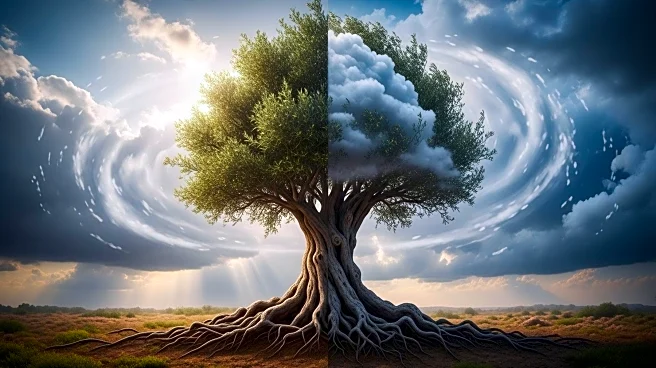What's Happening?
Israel is currently experiencing a complex emotional landscape as it navigates through a year marked by significant challenges and achievements. On one hand, the country is embroiled in a prolonged conflict, with hostages still unreturned, leading to societal polarization and unresolved issues such as military service equality. On the other hand, there have been notable successes, including the collapse of adversaries like Syria and Hezbollah, a setback to Iran's nuclear ambitions, and a stabilized economy. These contrasting narratives reflect the diverse perspectives within Israeli society, where some view the nation on the brink of redemption, while others see it teetering on the edge of an abyss. The emotional divide is evident, with each group emphasizing different aspects of the same reality, highlighting the challenge of bridging these narratives.
Why It's Important?
The dual narratives within Israel underscore the broader implications for its society and future. The ongoing conflict and societal polarization pose significant challenges to national unity and progress, potentially affecting public policy and social cohesion. Conversely, the achievements in foreign policy and economic stabilization offer hope and potential for growth. The ability of Israeli society to reconcile these narratives could influence its political landscape, impacting decision-making processes and the country's approach to international relations. The emotional divide also reflects the broader human experience of grappling with conflicting realities, emphasizing the importance of dialogue and understanding in fostering a cohesive society.
What's Next?
As Israel moves forward, the focus will likely be on addressing the unresolved issues that contribute to societal polarization, such as military service equality and the return of hostages. Efforts to bridge the emotional divide may involve fostering dialogue and understanding between the differing narratives. Additionally, the country's foreign policy successes could lead to further diplomatic engagements and economic opportunities. The upcoming year presents an opportunity for Israeli society to reflect on past achievements and challenges, and to embrace the potential for renewal and growth, as symbolized by the Rosh Hashanah holiday.
Beyond the Headlines
The contrasting narratives within Israel highlight deeper ethical and cultural dimensions, particularly the role of free will and responsibility in shaping the future. The Rosh Hashanah holiday serves as a reminder of the power of renewal and the capacity for individuals and societies to recreate themselves. This cultural reflection encourages a moral reckoning and the pursuit of a better future, unbound by past narratives. The emphasis on free will and responsibility underscores the importance of individual and collective agency in navigating complex realities and fostering positive change.








